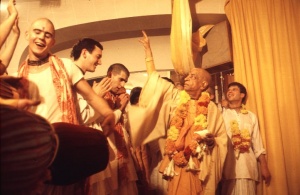CC Madhya 25.50: Difference between revisions
m (1 revision(s)) |
No edit summary |
||
| Line 1: | Line 1: | ||
{{ | [[Category:Sri Caitanya-caritamrta - Madhya-lila Chapter 25|C050]] | ||
<div style="float:left">'''[[Sri Caitanya-caritamrta|Śrī Caitanya-caritāmṛta]] - [[CC Madhya|Madhya-līlā]] - [[CC Madhya 25|Chapter 25: How All the Residents of Vārāṇasī Became Vaiṣṇavas]]'''</div> | |||
<div style="float:right">[[File:Go-previous.png|link=CC Madhya 25.49|Madhya-līlā 25.49]] '''[[CC Madhya 25.49|Madhya-līlā 25.49]] - [[CC Madhya 25.51|Madhya-līlā 25.51]]''' [[File:Go-next.png|link=CC Madhya 25.51|Madhya-līlā 25.51]]</div> | |||
{{CompareVersions|CC|Madhya 25.50|CC 1975|CC 1996}} | |||
{{RandomImage}} | |||
==== TEXT 50 ==== | ==== TEXT 50 ==== | ||
<div | <div class="verse"> | ||
:'mīmāṁsaka’ kahe,—'īśvara haya karmera aṅga' | |||
:'sāṅkhya' kahe,—'jagatera prakṛti kāraṇa-prasaṅga' | |||
</div> | </div> | ||
| Line 12: | Line 16: | ||
==== SYNONYMS ==== | ==== SYNONYMS ==== | ||
<div | <div class="synonyms"> | ||
''mīmāṁsaka''—the Mīmāṁsaka philosophers; ''kahe''—say; ''īśvara''—the Supreme Lord; ''haya''—is; ''karmera aṅga''—subject to fruitive activities; ''sāṅkhya kahe''—the atheistic Sāṅkhya philosophers say; ''jagatera—of the cosmic manifestation; ''prakṛti''—nature; ''kāraṇa''—the cause; ''prasaṅga''—thesis. | |||
</div> | </div> | ||
| Line 19: | Line 23: | ||
==== TRANSLATION ==== | ==== TRANSLATION ==== | ||
<div | <div class="translation"> | ||
"The Mīmāṁsaka philosophers conclude that if there is a God, He is subject to our fruitive activities. Similarly, the Sāṅkhya philosophers, who analyze the cosmic manifestation, say that the cause of the cosmos is material nature. | |||
</div> | </div> | ||
__NOTOC__ | |||
<div style="float:right; clear:both;">[[File:Go-previous.png|link=CC Madhya 25.49|Madhya-līlā 25.49]] '''[[CC Madhya 25.49|Madhya-līlā 25.49]] - [[CC Madhya 25.51|Madhya-līlā 25.51]]''' [[File:Go-next.png|link=CC Madhya 25.51|Madhya-līlā 25.51]]</div> | |||
__NOTOC__ | |||
__NOEDITSECTION__ | |||
Revision as of 07:17, 16 September 2021
Śrī Caitanya-caritāmṛta - Madhya-līlā - Chapter 25: How All the Residents of Vārāṇasī Became Vaiṣṇavas

His Divine Grace
A.C. Bhaktivedanta Swami Prabhupada
A.C. Bhaktivedanta Swami Prabhupada
TEXT 50
- 'mīmāṁsaka’ kahe,—'īśvara haya karmera aṅga'
- 'sāṅkhya' kahe,—'jagatera prakṛti kāraṇa-prasaṅga'
SYNONYMS
mīmāṁsaka—the Mīmāṁsaka philosophers; kahe—say; īśvara—the Supreme Lord; haya—is; karmera aṅga—subject to fruitive activities; sāṅkhya kahe—the atheistic Sāṅkhya philosophers say; jagatera—of the cosmic manifestation; prakṛti—nature; kāraṇa—the cause; prasaṅga—thesis.
TRANSLATION
"The Mīmāṁsaka philosophers conclude that if there is a God, He is subject to our fruitive activities. Similarly, the Sāṅkhya philosophers, who analyze the cosmic manifestation, say that the cause of the cosmos is material nature.